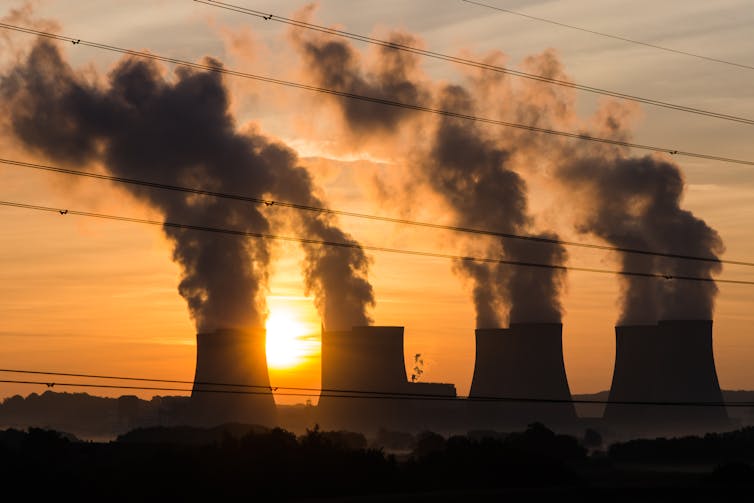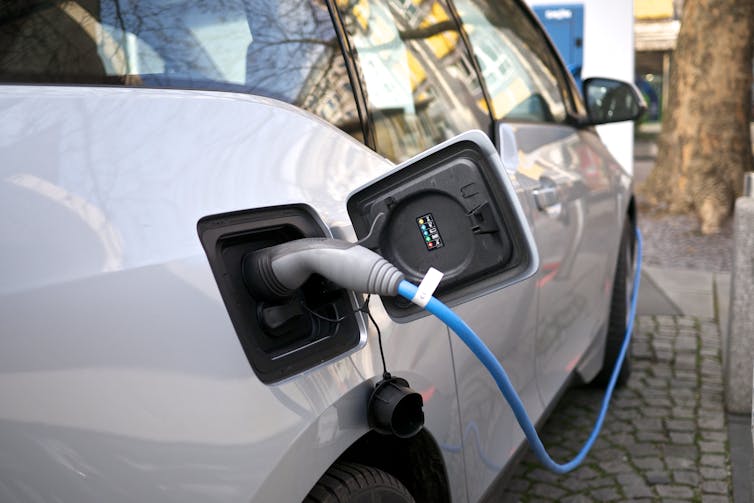
Here's what it would take to end emissions from fossil fuels
If the UK is to achieve net zero by 2050, it needs to get moving on making a successful green transition across fuel, transport and housing.
Dec. 10, 2021 • 6 min • Source
Achieving net zero greenhouse gas emissions in the UK by 2050 is a massive challenge. It’ll mainly be achieved by cutting fossil fuel use: including coal, natural gas and oil. Doing this will require rapid, deep transformation across the UK’s energy system.
Smaller energy transformations have taken place before in the UK. For example, during 1966 to 1977 , moving millions of buildings from using town gas (made from burning coal) to using North Sea natural gas involved building a national gas grid . but modern energy is far more complex and the UK has never transformed such a large, critical system.
There are two main ways we can cut emissions from fossil fuels: elimination and decarbonisation .
Elimination means that low-carbon energy sources such as renewables, hydrogen gas and nuclear power replace fossil fuels. This requires “ fuel switching ” – changing or upgrading systems across the country to run on these new fuels, such as moving from petrol to electric cars . The two largest domains where fuel switching is required are vehicles and building heating.
On the other hand, decarbonisation requires capturing emissions as they are produced. This technology, called carbon capture and use or storage, is generally done by chemically compressing carbon dioxide into a liquid and either storing it or using it to make synthetic fuels, chemicals and building materials.

Other “ negative emissions technologies ” that take greenhouse gases out of the air are being developed, but so far none are ready for mass deployment.
Challenges
In the UK, plans to reach net zero emissions are already well underway. Among contributors are the Committee on Climate Change , the Department for Business, Energy and Industrial Strategy and the National Grid .
Country governments, including Scotland , Wales and Northern Ireland have also made plans – but how achievable these will be in practice remains to be seen.
Among the many challenges that these plans pose, two stand out: sorting out mass fuel switching and deploying complex new technologies related to low-carbon fuels.
Mass fuel switching could cause problems if new equipment is initially too scarce, unreliable, or more expensive to buy or run than existing equipment. Additionally, actually meeting population energy demand using only low-carbon energy is far easier said than done, and could lead to shortages if not carefully controlled.
While these problems may only occur for a short time while we get used to a new, low-carbon economy, they would still require rapid responses from those governing the transition to avoid social unrest .
Most energy transition plans also rely on some new technologies being added to our roster to help generate more, greener energy. These include carbon capture and storage, as well as advanced nuclear tech such as small modular reactors and green hydrogen produced using low-carbon electricity. The speed with which these inventions are developed and adopted, both in industry and society, will have to increase if we are to meet climate goals.

My own research into how to make energy transitions successful shows that to keep a transition on track, we need strong political leadership .
Leaders shouldn’t just set ambitious energy efficiency goals. They must also support energy efficiency improvement programmes like retrofitting houses , encourage investment in energy technology research, and help local governments to make the transition easier for the public: for example, by installing more electric vehicle charging points .
Opportunities
Making a successful transition to low-carbon energy wouldn’t just help the UK meet its climate obligations . Other benefits could include better local air quality , less energy poverty , better national energy security and more reliable transport .
Social movements could play a key role during this transition. This might look like supporting vulnerable people (including the elderly, chronically ill and refugees) through the fuel switching process. And it could involve developing new businesses that improve the efficiency of a decarbonised supply chain .
And internationally, the UK could become more economically competitive within a decarbonised world, demonstrating how industrialised countries can cut emissions while maintaining economic power and social wellbeing for their citizens.
Rachel Freeman does not work for, consult, own shares in or receive funding from any company or organisation that would benefit from this article, and has disclosed no relevant affiliations beyond their academic appointment.


